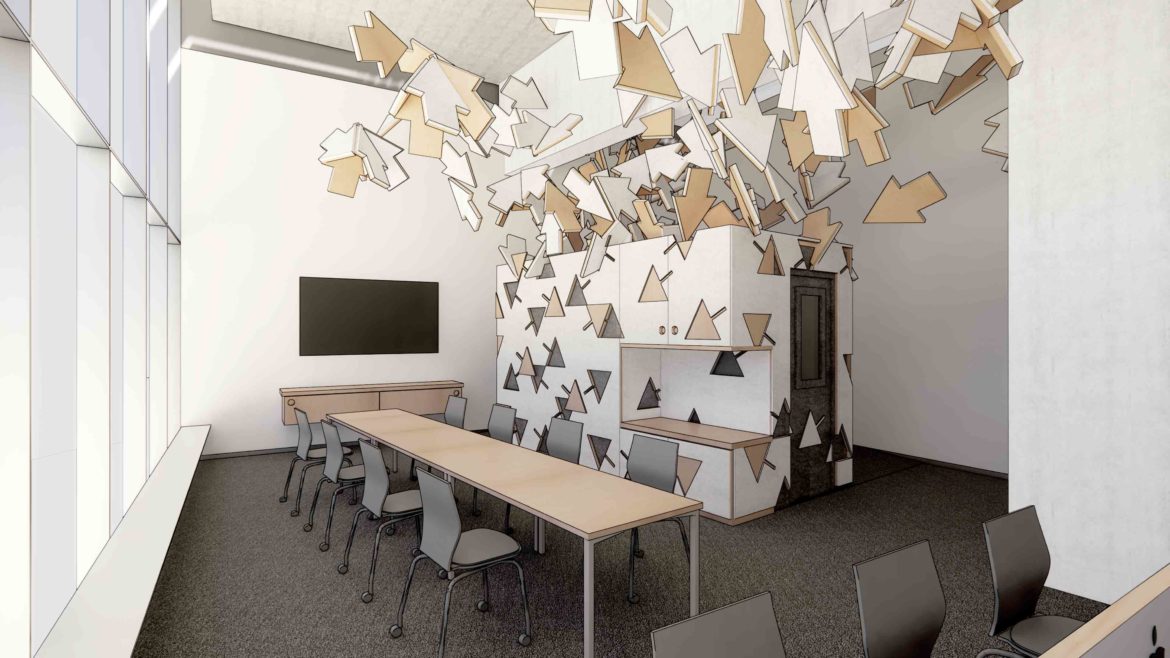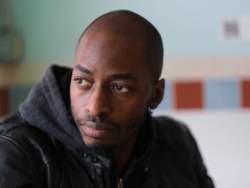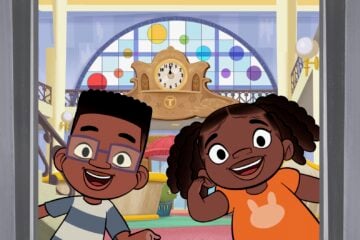Virginia’s VPM partners on Community Media Center in Richmond

An Liu / Institute for Contemporary Art at Virginia Commonwealth University
An artist's rendering of a recording booth to be installed in the VPM + ICA Community Media Center.
Novice and advanced Virginia-based podcasters alike can now build their skills through the VPM + ICA Community Media Center, a free and public recording studio and workspace co-sponsored by Richmond’s VPM and the Institute for Contemporary Art at Virginia Commonwealth University.

The center aims to amplify the voices of local storytellers and make podcast creation more accessible for VCU students, Virginia community members and professional podcasters. Its director is Chioke I’Anson, perhaps best known as a voice of NPR’s underwriting credits.
Also an assistant professor at VCU, I’Anson pitched the idea to VPM early in 2019. As a professor and NPR employee, he said, he saw an opportunity to bring public media to the university level and to make skills for creating podcasts and other media more accessible.
“If we can expand the access to knowledge, then we can get more people making good media,” I’Anson told Current.
VPM CCO Steve Humble was a board member for the station when I’Anson suggested the collaboration. “At that time, I was excited about it, and I continued to be more and more excited about it,” Humble said.
According to Humble, VPM pursued the partnership because it was a chance to undertale a long-term initiative “with an important university here in Richmond and to feel like we can really make a difference.” VPM and VCU are committed to a four-year contract.
By partnering with the Community Media Center, which launched virtually in the fall, VPM may benefit by finding podcasts that it could help produce, Humble said. “If nothing else, the goal is really to help tell interesting stories locally,” Humble said.
The Community Media Center’s location also gives VPM another “place for people to hear about us,” Humble said, and provides the station’s reporters with a downtown location for recording and editing.
VPM’s main responsibilities include working with the ICA to create programming and sharing the costs of the initiative. Humble declined to disclose how much VPM is investing.
“From a day-to-day perspective, our investment helps fund the people that will be in the space,” Humble said.
‘100 percent free’
The Community Media Center will hold podcasting and media classes, workshops on podcast development and critique, symposia with invited speakers and mentors, and live recordings of podcasting programs.
I’Anson said that the center being free and open to the public is crucial to its purpose.
“We have to admit there’s a lot of really great audio initiatives out there,” I’Anson said. “There’s the [PRX] Podcast Garage. There’s everything the Association for Independents in Radio is doing. There are so many really great resources. It’s just that we’re 100 percent free.”
So far, the virtual session has largely attracted participants from the Washington region. Abby Mullen, a term assistant professor in the Department of History and Art History at George Mason University and host and producer of the podcast Consolation Prize, has attended almost all of the Community Media Center’s events.
Mullen said that she and her team began Consolation Prize, a history podcast about consuls, during the pandemic. They participated in a producers’ institute in October featuring Alison MacAdam, a freelance story editor who previously worked for the NPR Training team.
As part of the class, MacAdam listened to Consolation Prize’s third episode and advised the producers to add a tagline at the beginning of each episode. The tagline is now “A podcast about the history of the United States in the world through the eyes of its consuls.”
“She suggested that in order to bring people in, you need to tell them what you’re doing,” Mullen said.” She said, ‘Put something concrete in there, put something punchy in there.’”
“Getting that feedback from Alison at a pretty early stage in our show was just incredibly helpful,” Mullen said. “It really helped us think about how we talk about the show and how we present it.”
For a workshop on developing ideas, I’Anson also featured Nathan Moore, GM of WTJU in Charlottesville and co-founder of the Virginia Audio Collective, a network of podcasts.
“I’ve been involved in radio for a long time, podcasting for less time, but I have some experience in the field and just want to pay it forward,” Moore said. “I think that we all benefit as a community and as a state and as a country when people are empowered to share their stories and connect with one another.”
Art beyond galleries
Making podcasts should be considered a serious creative practice, said Dominic Willsdon, executive director of the ICA. Adding the Community Media Center contributes to his mission of making the ICA “an institute for contemporary culture broadly,” he said.
“We’re not here to focus only on art that is shown in galleries,” Willsdon said. “There can be lots of different types of cultural practice that give you access or give you a viewpoint onto what’s going on in the world today, and I want to be open to lots of different things like that.”

While the Community Media Center has already opened virtually, construction on a physical space will begin in early summer with an anticipated opening for in-person use for the fall, COVID restrictions pending. VCU School of the Arts and ICA faculty and staff are designing the center, along with graduate students from VCUarts’ Department of Interior Design.
Because traditional sound booths are not aesthetically pleasing, Willsdon said, the designers wanted to find a way to make them “a sculptural element that would make the space exciting, immersive [and a] visual environment.” The booths will double as pieces of art, crowned with flocks of arrow shapes inspired by birds. The space will also include a commissioned mural by a VCU graduate in illustration.
Willsdon said that he hopes partnerships like the one between VPM and ICA continue and grow.
“Museums can’t just talk with other museums about what to do, and broadcasters and media companies organizations can’t just talk to themselves about what to do,” Willsdon said. “I think the more we can get this kind of cross-functional conversation going, will be better for everybody and enable us to do more things for the public.”






